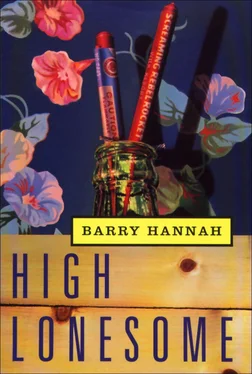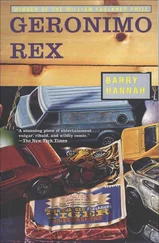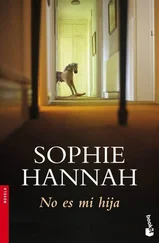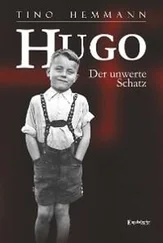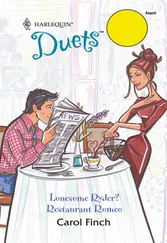“That’s no good, Paul. You shouldn’t hit” Drum had awoken and come out. His big fingers were around a fresh cold beer. “Oh, I hit my second wife. She thrived on it. Some women like hitting, they work for it. But it’s a bad thing. A man of your sensitivity, with that sad little child in you, you won’t survive, is what I’m saying.”
“I love the sad child!” said Minny.
“But it makes an end to things at least. You need to end things, Paul. Purgatory is much rougher than hell. Well I know. You’ve got to wish them well, and be off. Wish them well in love, hope they have good orgasms.”
“My God!” Smith could not imagine this charity. Sometime later in the week Smith asked Drum how he’d lost three wives.
“Because I was a failure, man!” Drum seemed delighted. “I wrote and wrote and couldn’t get published. I quit all my jobs. I’d had it with facts, the aeronautics industry. Working plans to fly in a coal mine, baby! The heart, Paul, the heart, that’s where it is.”
On the last of his GI bill the man was taking ceramics, photography, sculpture, and Smith’s writing class.
“I pride myself on being a dilettante! I am looking for accidental successes. Heart accidents. I want to slip down and fall into something wonderful!”
As for Drum’s physical heart, there was a bad thing running in his family. His father and two older brothers had gone out early with coronaries, and he himself took nitroglycerin tablets to ward off angina.
Even Smith’s punk band excited Drum. Anything declamatory of the heart moved him. He was very often their only audience. He applauded and commended, through their vileness. They switched instruments, versatile in absence of talent. It didn’t matter.
“ Everything must be explored! Nothing left untouched!” Drum shouted, slugging down his cheap beer, smoking his generics.
They played their own “Yeast Infection Blues” and a filthy cover of George Jones’s “He Stopped Loving Her Today.” The regular guitarist was a vicious harelip pursued all over town for bad checks. The singer was a round man with dense eyeglasses and a squint who sold term papers to fraternity boys. They called him the Reverend. The bass-man was a boy who never wore shoes, hardly bathed, and in appearance approached the late Confederate veterans around Appomattox — gaunt, hang-necked, and smutty. Drum absorbed them all. They were his children, junior alcoholics to Smith. Sometimes he’d dance with Minny or Pepper. They shook the little green house and the police came. Perfect.
Smith poured Southern Comfort in a Pepsi can in order to make it through his lectures, which seemed a crucifixion. The crippled girl Angel B. seemed satisfied, liberated more thoroughly and writing even worse. As for his own heart, Smith wanted to get rid of it. He missed his wife terribly. The thing pounded as if it were an enormous fish in him. He was barred from his old home. The band was angry over his lack of endurance on the drums. One night Drum brought him over some chicken soup, vitamin B, and gluconate. He was worried.
“Look at you. Look at this room,” he said.
Smith’s SS overcoat was spattered with white paint. He had painted everything instead of cleaning. He had painted even Minny’s dog. It was under the table licking itself. He had nailed bedsheets to the floor. The novel he was writing was strewn out in copies all over the musical instruments. He and the band were singing his novel. The children from his first marriage were not allowed to visit him anymore. He had been fired at the college. Bare inside his overcoat, with a Maltese cross made by Drum hanging from a chain around his neck, he had grown so thin that his wedding band had fallen off somewhere. He was now almost pure spirit, as Minny called him.
“We need your big heart, Paul. The forces of good need you. Technique and facts and indifference are out there winning. Money is winning, mere form and the tightasses are winning. Commerce is making the town uglier and uglier. We Christians need you. You’re giving over to low anger and spite, drinking away your talent. An old bad thing coiled in the dust, that’s not you.”
Smith poured the remainder of a jar of cherries into a mug half filled with Southern Comfort. The overcoming taste would remind Smith forever of his last days in this town.
Drum had made the mug. On it was an ugly face with a cigarette in its lip. It was one of the forms of “Sarge,” an old army drunk Drum had known in Panama. The man had been only in his thirties, like Smith, but already grotesque. He would line up for review every morning, everything wrong with his uniform, but with a tiny smile and ruined goggle-eyes, maimed in every inch by the night before. He’d been busted from sergeant four times.
Later Smith fought with the band and threw them out. Minny ran out of Valium. Now living was almost impossible without constant fornication. People with police records began showing up in the house. Some played musical instruments or sang, then stole the equipment. One night while he was plying Minny, who poured out high spiritual sighs, he had to have a drink. On his way to the kitchen, he caught a thief in the house. The man sprinted out the back window as Smith pulled his father’s antique shotgun off the wall. Then out came Minny, screaming for him please to not shoot anybody.
In the morning he accused her and her dog, who had remained silent, of setting him up. He put the cur in her arms and kicked them both out. Then he fell out in a sleep of a few hours. When he woke up it was midafternoon, and he knew something was gone. The antique shotgun was not on the wall. He stumbled to his kitchen and pulled a hunting knife out of his drawer. He intended to cut Minny’s pre-Raphaelite hair off and drag her down the railroad tracks by her ankles. In a swimsuit and his serious coat he went out to the tracks. He seemed to remember her other place was near the tracks somewhere down there. So he walked and walked and then he was in a black section of town, there in his overcoat with lion-tamer boots on, holding the large saw of his knife, in the hottest summer on record. In the overcoat he was drenched, just an arm with the pounding awful fish of his heart inside him. A black teenager, tall, came out of one of the houses and asked him what he was doing with that knife out here, his mama didn’t like it.
“Hunting woman.”
“You sit down in that tree shade.” Smith gave him the knife. “How much you take for that coat? I can get that paint off it.”
“I’ll sell you the coat if you’ll call a number for me. I don’t feel good. I’m not all right. Here’s some money. Please get me some liquor too.” He gave his wallet to the boy.
“You wait.”
When Drum at last came out across the tracks and knelt beside him, Smith had terrible shakes, and could not pass out like he wanted to.
“You think you’re drunk, kiddo? Shit, this is nothing. I was drunker. And I was drunker alone. ” Drum laughed.
Smith sold the black boy his coat for fifty dollars and got back his wallet. Then Smith stared into his wallet.
“Drum? I got exactly the same in my wallet. That boy bought my coat with my own money.”
“Forget it. It was a horrible coat. A chump’s coat. A pretender’s coat. It was the coat of a man with a small dry heart.”
“It was?”
Smith was out of money now, but he was waiting for a Reader’s Digest sweepstakes check very seriously. His unopened mail was a foot high, but none of it was the right envelope. Then a letter came offering him some work in Hollywood. He took it around town, running up tabs with credit on it. Some people still liked Smith. One night late he came in from drinking and misplacing his car. He felt there was something new in the place. Yes, there it was. On the kitchen table. The kitchen had been cleaned. But on the table was the final version of “Sarge,” the life-size ceramic head of the grinning old drunk, the butt of a real Pall Mall hanging from his lips. Drum, a year in labor on it, had given it to Paul Smith. There was a short note underneath it: “All yours. Go with Sarge.” Smith did not know it then, but this was as far as Drum would ever go in the arts. At first it made Smith afraid. He thought it was an insult. But then he knew it wasn’t. He laid his head down and wept. He had lost everything. He did not deserve this friend.
Читать дальше
